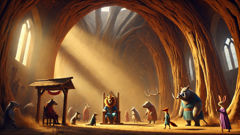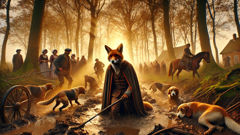Introduction
Long ago, when the mists curled over the low, green meadows of the medieval Netherlands and the windmills had yet to cast their sweeping arms across the horizon, the forests and villages pulsed with stories whispered by the riverbanks. Among these, none traveled further nor grew more beloved than the legend of Reynard the Fox. From bustling town marketplaces to quiet peasant cottages, his name was spoken with a mixture of admiration and wariness. In the hearts of Dutch folk, Reynard was not simply a fox—he was a living symbol of cleverness, a survivor in a world ruled by the strong, a trickster who outwitted the mighty, and a mirror for the vices and virtues of humankind. The rolling fields, sleepy hamlets, and tangled woodlands served as a living stage for Reynard’s escapades. He darted through hedgerows, outfoxed noblemen, mocked the pompous, and slipped through the grasp of would-be hunters time and again. Yet for all his mischief, Reynard’s actions were never senseless; each scheme, every twist of wit, revealed something deeper about justice, pride, and the price of cunning. His stories painted the medieval Netherlands as a world both harsh and enchanted—a place where even the weakest could prevail if only they had the wits to see opportunity in misfortune. As the firelight flickered across wooden beams and children pressed close to their elders, tales of Reynard’s exploits were passed from lips to eager ears, becoming a cornerstone of Dutch culture and medieval literature. It’s in these tales that the boundaries between animal and human blur, and laughter walks hand-in-hand with wisdom. So step back into that world: where kings convene courts for animals, where the fate of a sly fox can upend the affairs of an entire realm, and where the lessons of yesterday echo still among the wind-swept dunes and ancient forests of the Netherlands.
Court of Animals: The Summoning of Reynard
The great hall of King Nobel the Lion was abuzz with unrest. Rumors of Reynard’s mischief had finally reached the ears of the animal monarch, and the noble court seethed with a hunger for justice—or at least for a good spectacle. The court itself was a marvel, built within a vast hollow oak at the center of the Groote Bos, the ancient forest said to be as old as the dunes themselves. Ivy crept along its walls, and shafts of sunlight filtered through high windows to illuminate the gathered assembly: wolves and badgers in threadbare capes, rabbits nervously fidgeting on carved benches, an owl perched solemnly above all, and, at the head, King Nobel’s golden mane blazing like a standard.

As was custom, complaints were heard by the king before all. On this day, the queue seemed endless. First came Isengrim the Wolf, his voice trembling with fury as he recounted how Reynard had tricked him from his share of a farmer’s sheep. The next was Bruin the Bear, still rubbing his paw from a beehive disaster that left him more swollen than satisfied. Then came Chanticleer the Rooster, who claimed Reynard had snatched away his beloved hens under the very noses of the barnyard.
The air grew thick with accusations: theft, deception, insults, and outright mockery. Yet as story after story was told, a thread emerged—none could deny Reynard’s brilliance, nor could they claim to have bested him. King Nobel’s eyes narrowed in thought. He raised a massive paw, calling for silence. “Let it be known throughout the land,” he proclaimed, “that Reynard the Fox is to stand trial before this court. Summon him with all haste, lest disorder reign in my kingdom.”
It fell to Grimbert the Badger, Reynard’s own cousin, to deliver the summons. Grimbert set out at dawn, weaving through the dew-soaked fields, past grazing cattle and hidden molehills, toward Malpertuus—the secret den of Reynard. The journey was fraught with anxiety. Grimbert respected his cousin’s wit, but he also knew that crossing Reynard was like challenging the wind itself: one could never predict which way it might blow.
When Grimbert reached Malpertuus, he found Reynard reclining at the entrance, his fur ruffled from a night’s adventure but his eyes bright with anticipation. He listened to Grimbert’s message, never interrupting but smiling in that enigmatic way that made even his closest kin uneasy.
“So, the king wants me at court,” Reynard mused, his tail flicking thoughtfully. “No doubt to parade my crimes and satisfy his subjects’ thirst for justice. Yet perhaps justice is not as straightforward as they hope.” He stood, brushed off a stray leaf, and beckoned his cousin. “Come, Grimbert. If there’s to be a performance, I’ll play my part. But remember—truth wears many masks, and so does wisdom.”
And so, with the sun climbing above the willows, the two set off for the oak hall. Reynard padded lightly, his mind already weaving the arguments and stories that might sway a king or confound a wolf. As they neared the court, every animal turned to watch—some with anger, others with curiosity, but all aware that where Reynard walked, trouble and wonder followed.
Trickery and Trials: Reynard’s Defense
The court was packed, the air tense with anticipation. Reynard entered not with fear, but with a wry confidence that unsettled his accusers. King Nobel signaled for silence, and the proceedings began. One by one, Reynard’s adversaries presented their cases: Isengrim recounted the sheep incident in painstaking detail, embellishing his own innocence; Bruin waved his bandaged paw, grumbling about Reynard’s honey trap; Chanticleer’s lament about his lost hens grew ever more dramatic, feathers ruffled with outrage.

Reynard listened intently, head cocked to the side, eyes never leaving those who spoke. When his turn finally came, he stepped into the center of the hall. His voice, calm and measured, held the entire court captive.
“Noble King,” he began, bowing low, “I see that my reputation runs before me, and perhaps with longer legs than truth itself. My accusers have painted me as a villain—but is it a crime to survive by wit, when strength alone would doom me? Is it not true that Isengrim, for all his claims, was first to cheat and seize what he could not earn? That Bruin’s greed led him to honey he had no right to, and that Chanticleer’s hens walked freely into my den, bewitched by tales of adventure?”
A ripple of laughter ran through the assembly. Even King Nobel could not suppress a faint smile. Still, the accusations were grave, and the call for justice could not be ignored.
“Let us hear witnesses,” declared the king. Each witness, however, found themselves disarmed by Reynard’s sharp tongue and subtle reasoning. When Bruin complained of honey theft, Reynard gently reminded the court that Bruin had trespassed first. When Isengrim bemoaned his lost sheep, Reynard cited an agreement made under dubious circumstances—one that favored only the wolf.
With each argument, Reynard exposed not only his own cleverness but also the hypocrisy and greed of his accusers. The animals found themselves chuckling, then pausing in reflection. Was justice truly so simple? Did not every animal seek advantage in its own way?
Yet, as the debate raged on, a darker current swirled beneath the surface. Some urged the king to make an example of Reynard; others whispered that such cunning was needed to balance the kingdom. King Nobel weighed these arguments carefully. At last, he addressed Reynard: “You have spoken well, fox, but wit alone cannot excuse all wrongs. Yet nor can brute strength or blind accusation. Go, and consider your place in this realm. If you can prove yourself a servant of true justice, not just self-interest, there may yet be a place for you here.”
Reynard bowed, his eyes glinting with something like gratitude—or perhaps merely another layer of cunning. The trial had ended not with a verdict, but a challenge. And as Reynard left the court, all knew that his story was far from over.
Cunning Unleashed: The Escape from Doom
Word spread quickly that Reynard had not been condemned but instead set a task: to prove his loyalty to the kingdom. Many saw this as mercy; some called it foolishness. Reynard, for his part, saw it as an opportunity.

Not long after the trial, news reached the court of a far greater threat: a marauding band of humans, armed with iron traps and hunting dogs, had begun to encroach on the Groote Bos. Their leader, a cruel nobleman from a neighboring region, boasted of his plan to rid the woods of foxes and claim the land for more sheep and crops.
King Nobel called an urgent council. Many animals, fearful and desperate, suggested hiding deeper in the forest. Others looked to Isengrim and Bruin to lead a defense. But both were cowed by tales of the humans’ weapons. It was Reynard who stepped forward.
“If it is wits we need,” he declared, “then give me leave to act. Let strength rest for now; I will turn the hunter’s mind against itself.”
With only Grimbert for company, Reynard began weaving a plan. They scattered false trails and misleading scents, dug decoy dens that led would-be hunters into muddy bogs, and spread rumors among the peasants about a monstrous wolf lurking in the woods—so convincing that even Isengrim was forced to lie low for fear of angry mobs.
But Reynard’s boldest move came when he donned a tattered cloak taken from an abandoned scarecrow and crept into the very village that supplied the hunters. There, he worked his charms among the townsfolk, spinning tales of the noble fox who protected crops by keeping rabbits and mice at bay. He convinced the local miller that without foxes, the fields would soon be overrun, and he even persuaded the baker’s children to set out food near the woods as an offering.
When the nobleman’s party returned empty-handed, their boots caked in mud and their dogs exhausted, they were met by angry villagers who demanded an end to the senseless hunt. The nobleman, mocked and shamed, withdrew his men.
Back in the Groote Bos, Reynard was hailed as a hero—though some grumbled that his methods had brought as much chaos as order. King Nobel called another court session. This time, Reynard stood not as an accused but as a savior.
“You see,” said the fox, “that wisdom and cunning can defend our home where teeth and claws might fail. The world is changing; only those who adapt will thrive.”
A new respect settled over the assembly. Even Isengrim and Bruin found themselves nodding, begrudgingly. The story of Reynard’s cunning spread from hamlet to town, from field to forest, until it became legend—a testament to the power of mind over might.
Conclusion
The legend of Reynard the Fox wove itself into the fabric of Dutch culture, echoing through centuries as both warning and inspiration. Reynard was never simply a villain or a hero. He was a creature who thrived in the gray spaces between rules, who outwitted the powerful not with malice, but with necessity and charm. To some, he was a rogue; to others, a champion of the underdog; but to all, he was unforgettable. His legacy lived on in every whispered tale around a hearth and every clever child who dared question the world’s order. In a land crisscrossed by rivers, dikes, and ancient forests, Reynard remains a symbol of survival through intelligence—a reminder that sometimes wisdom is sharper than claws, and that true justice comes not from power, but from understanding the world’s many faces. Even today, as windmills turn and city lights flicker where forests once stood, the laughter and lessons of Reynard echo on, inviting each new generation to see through the eyes of a fox who danced along the line between mischief and wisdom.













